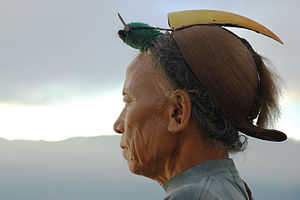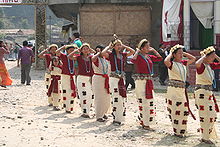- Nisi
-
 Un Nisi portant la coiffe traditionnelle avec un bec de calao
Un Nisi portant la coiffe traditionnelle avec un bec de calao
Les Nisi (ou Nishi, Nissi, Nyishi, Nyising) sont une population qui habite principalement l'Etat indien de l'Arunachal Pradesh. Leur nom, dans leur langue tibéto-birmane, signifie "gens de la terre" ou "être humain".
Les Nisi habitent les districts de Papum Pare, de l'East Kameng et du Lower Subansiri, du Kurung Kumey, certaines parties des districts du haut Subansiri dans l'Arunachal Pradesh, ainsi que le district de Darrang et de North Lakhimpur dans l'Assam. Ils sont au nombre d'environ 300 000, ce qui en fait le groupe le plus nombreux de l'Arunachal Pradesh, devant les Adi et les Galong (ou Abor).
Most Nisi do not like the idea of intermarriage with other neighboring tribes, which also is common about the other tribes. Polygamy is prevalent among the Nyishi. It signifies ones social status and economical stability and also proves handy during hard times like clan wars or social huntings and other social activities. This institution, however is being challenged. They trace their descent patrilineally and are divided into several clans[1].
Sommaire
Economie
Les Nisi sont agriculteurs et pratique le jum, une forme de culture itinérante. Les principales cultures sont le riz et le millet. Le riz est leur aliment de base, supplemented by fish, meat of various animals, edible tubers and leafy vegetables. Before modern economic invaded them, they use batter system. They are greatly valued the generalized reciprocity and also balance reciprocity in their economic system. A locally-made drink known as "opo" is mostly made from millet and rice. This is used at all social gatherings and important events. The Nyishis are fond of it. Nyishi, traditionally being dependent on the forest, eat fruits,root, bamboo shoots and fish. Traditional ways of preparing them include steaming, roasting and smoking.Now they have shifted to market exchange money.
Vêtement
Traditionally, Nyishi plait their hair and tie it neatly at the forehead with Tibetan thread. A brass skewer passes horizontally through the tied hair. Cane rings were worn around the waist, arms and legs. Men wore a cane helmet surmounted with the beak of the Great Indian Hornbill.The usage of actual Hornbill beaks is discouraged these days due to tough wildlife protection laws since The Great Indian Hornbill is a protected species and generally due to growing awareness among the people as well. It is being supplemented by beaks made of cane or other materials and the entire headgear/cane helmet itself is readily available in the market for purchase. Additional decorations varied depending upon the status of person and were symbols of manly valour.
The clothing of the men consists of sleeveless shirts made from thick cotton cloth, striped gaily with blue and red together with a mantle of cotton or wool fastened around the throat and shoulders. Strings made of beads in varying sizes and colours were also worn, mainly for decoration purposes. They used to carry a dao (aoryo in Nyishi) (short sword) and a knife (Ryukchik) in a bamboo sheath. Their armament consists of spear with iron-head, a large sword, and a bow with arrows, tipped with poison (aommyo) on it. During war both the chest and back are covered with the mithun hide, and over it they wear a black cloak made of indigenous fibre.
The Nyishi women generally wear a sleeveless mantle of striped or plain cloth, its upper part tucked tightly over the breast and enveloping the body from the armpits to the centre of the calves. A ribbon is tied at the waist. A girdle consisting of metal disks and cane garters is worn at the waist. Their hair is parted in the middle, plaited and tied into a chignon just above the nape. Their ornaments include multicolored bead necklaces, brass chains, metal bells, huge brass or silver earrings and heavy bracelets of various metals.
Religion
Nyishis are the animist (faith), a religion which commemorates their ancestors, emphasizes a belief in many spirits and superstitions, and includes religious rituals which coincide with lunar phases or agricultural cycles. Abo-Tani is revered by the Nyishi as the primal ancestor of the animist tribes of Tibetan or quasi-Tibetan origin. Strictly speaking the Nyishi does not have common religious festival, however, the Nyokum Yullo is now treated as a common social festival (for bumper harvest). It is celebrated on 24 to 26 February each year since 1967-68 at Joram village in the Lower Subansiri district.
Among the Nyishi, there are currently approximately 3,00,000 (80%) transformed into Christians. Small groups of Hindus and Buddhists also exist among the Nyishi. Polygamy is practised by the Nyishi, with a rich man having as many as wives.
The hornbill issue
The Nyishi, who traditionally wear cane helmets surmounted by the crest of a hornbill beak, have considerably affected the population of this bird.
Several organizations, such as the Arunachal Wildlife and Nature Foundation and the Wildlife Trust of India, have been trying to stop the Nyishi hunting these birds in order to protect them from extinction. Nature reserves, such as the Pakke Sanctuary, are being set up to protect the birds, while artificial materials, such as fiberglass, have been introduced as an alternative to the hornbill beak in Nyishi dress. While the Bopa ceremony is an important part of Nyishi tradition, and the campaign has faced stiff opposition, the Nyishi have recognised the possibility of the extinction of the Great Indian Hornbill, and 70% of the Nyishi have already accepted this new idea.[citation nécessaire]
Tradition / Religion of Nyishi of Arunachal Pradesh ....Tradition of nyishi is piomo (black and whit cloth) poyo fibung (hornbill head) , rioku horio(serf weapon) tasiong ( ornament )they are important tradition system in nyishi tribe Arunachal pradesh.
Religion ... nyishi is mostly belief in donyi polo (sun and moon) nyishi does not convert/ belief Hindu and Buddhist religion ,,, 5 percent nyishi people have convert the alean christian riligion ...
Notes
- (en) India Ministry of Information and Broadcasting Published by Publications Division, Ministry of Information and Broadcasting, Govt. of India, Arunachal Pradesh, 1979, p. 15–6
Catégorie :- Groupe ethnique d'Inde
Wikimedia Foundation. 2010.

